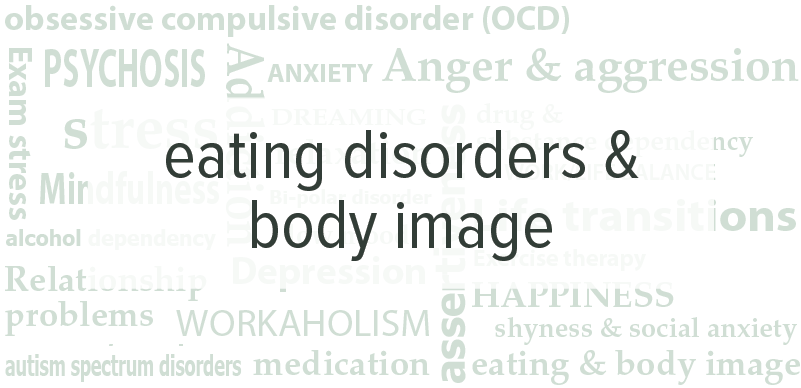Eating and body image – eating disorders
Eating and body image issues arise when people have distorted views of their own bodies and become obsessed with their weight and size, feeling embarrassed or self-conscious about themselves. They may become obsessed with losing weight and may begin to diet and exercise. In addition, stress and feeling unhappy can disrupt eating patterns resulting in loss of appetite or cravings for certain foods. Over a long period, these disrupted patterns of eating and exercising can develop into eating disorders such as Anorexia Nervosa, Bulimia Nervosa and Compulsive Eating.
Eating disorders are commonly seen as a female problem, but they actually affect both men and women and have a big impact on sufferers physically and emotionally.
The symptoms of an eating disorder
Anorexia Nervosa: This is a life-threatening disorder that stems from an intense fear of gaining weight. Sufferers may become obsessed with food restriction or exercise; have a distorted image of their own body; weigh themselves excessively; have a low self-esteem; feel depressed; and feel their control over their food or weight is their only way of coping. The physical effects of anorexia are very serious. Starving the body can weaken the heart and muscles.
Bulimia Nervosa: Bulimia is characterised by binge eating followed by ‘purging’. Purging might be in the form of self-induced vomiting, excessive exercise, or using laxatives to prevent weight gain. Someone with bulimia might hide or hoard food or eat in secret; be obsessed with food and their weight; feel depressed; and feel disgusted or ashamed of their body. The physical effects of bulimia are very serious. Regular vomiting can cause a number of serious physical effects including tooth erosion and tears in the stomach and intestines.
Compulsive Eating: Some people feel they cannot control their eating. They might continuously graze or have periods of binge eating when they eat way beyond the point of feeling full.
The causes of eating and body image issues
Pictures in the media and on tv can make us feel inadequate about our bodies and lead to eating and body image problems as we strive to achieve the perfect body. We may be affected in different ways. For example, men may start exercising obsessively to mould their body into the ideal shape while women might diet obsessively to reach size ‘0’. Whatever the method there is often an underlying problem of low self-esteem in people with an eating or body image disorder. However there is no one cause of an eating disorder. Rather, they usually arise when things such as stress, personality and the perceived expectations of others combine to create pressure on an individual.
Further information
Our booklet explores the topic of eating disorders and body image issues in more depth and looks at some of the reasons why these issues develop. We look at some of the most common disordered eating diagnoses and the types of behaviours, thoughts and feelings that accompany them. We also discuss what you can do if you think you may have an eating disorder or body image issue.
Download our free pdf booklet here >
Useful websites: www.b-eat.co.uk
Self help
There are many self-help books on the subject of eating and body image. We have listed a few that you may find helpful below.
- The Broken Mirror by Katherine Phillips
This is currently one of the best books available for understanding Body Dysmorphic Disorder (BDD) and problems related to body image. - Eating in the Light of the Moon: How women can transform their relationship with food through myths, metaphors and storytelling by Anita Johnston.
Feel free to contact us to ask about psychological therapies available at our centres that may help with eating disorders or body image issues.

